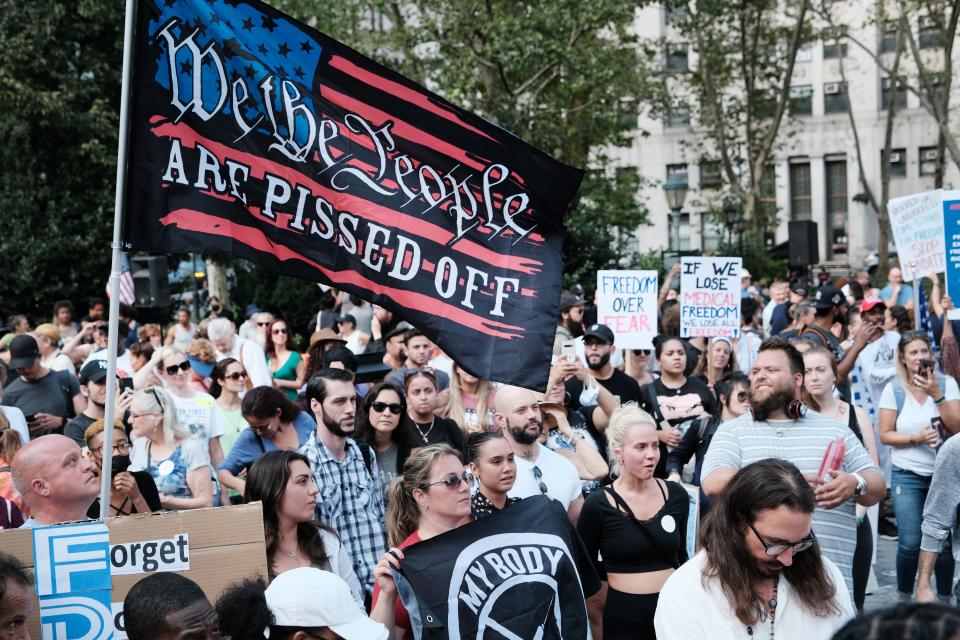From Cambodia to Canada, dozens of other nations beat US in COVID-19 vaccinations

For a time, the U.S. vaccine rollout was the envy of much of the world. In a wildly expensive logistical miracle, the United States and other rich nations deployed millions of doses over the winter and rapidly flattened COVID-19 cases.
Since then, the USA has become a global vaccine laggard, the percentage of its population inoculated lower than dozens of other nations. That includes all of its peers among affluent democracies in the Group of Seven countries, including Canada, the United Kingdom and Germany.
In many cases, the gap has become massive. Fifty million more Americans would be fully vaccinated if the United States had been able to match Canada’s enthusiasm for shots, for example.
Supply isn’t the problem – a complicated and confounding lack of demand is to blame.
How does COVID-19 affect me? Don’t miss an update with the Coronavirus Watch newsletter
“The United States is very unusual,” said Michael Bang Petersen, a professor at Denmark's Aarhus University who leads a project on how democracies respond to COVID-19. He said Americans have uniquely politicized the virus response, undermining the demand for vaccination.
The result: U.S. vaccination rates vary widely between states and closely track along political lines.

“Being a Democrat is one of the best predictors of being vaccinated,” said Dr. Céline Gounder, an infectious disease specialist who was a member of the Biden-Harris Transition COVID-19 Advisory Board. For some conservatives, opposition to vaccine mandates has become “the ultimate test of loyalty to your in-group,” she said.
Global vaccine supply has improved. The United Arab Emirates, Denmark, Cambodia, Mongolia and Chile are among the dozens of nations that have fully vaccinated a larger percentage of their populations than the United States, according to Friday Our World in Data statistics.
The USA, where new cases remain among the highest in the world, marked more than 700,000 COVID-19 deaths.
“It’s depressing; you cry,” said Dr. Ali Mokdad, professor of health metrics sciences at the University of Washington in Seattle. “What happened here?”
Pandemic politics a 'US-centric thing'
The pandemic politicization bewilders many experts.
In Denmark, COVID-19 politics often revolve around the question “is the government performing well?” Petersen said. That's in stark contrast to the USA, where mask mandates, lockdowns and vaccine passports have all been political firestorms.
“This seems to be a very U.S.-centric thing,” Petersen said. It's led to political gridlock and pandemic restrictions that vary by state, county and city – rather than the unified response of many nations.
Tracking COVID-19 vaccine distribution by state: How many people have been vaccinated in the US?
U.S. public health messaging put the onus on individuals, asking them to mask up or get vaccinated to protect themselves.
Although individual responsibility may be a powerful message to Americans, it doesn't advance the kind of "community level solutions" needed in a pandemic, sociologist and author Jennifer Reich told USA TODAY. Reich wrote a book on vaccine refusal.
She recalled taking a trip to Montreal where she was asked for her vaccine records at every turn. It “changes interactions in the community,” she said.
US has a trust problem with vaccines
Politics isn't the only reason the United States struggles to get tens of millions of people vaccinated. The nation also has a trust problem.
Because vaccines are given to healthy people to prevent disease, they inherently require a high level of trust, Reich said.
That's a problem in the USA.
There's an unusual amount of disagreement about whether science can be trusted, which enables vaccine hesitancy to become more mainstream, Patrick Sturgis, a professor at the London School of Economics and Political Science, told USA TODAY.
Mapping coronavirus: Tracking U.S. cases and deaths
Sturgis co-wrote a study on the connection between vaccine confidence and trust in science. The problem in the USA could be a lack of “social consensus” about the trustworthiness of science, he said.
He compared the USA to France, a nation “famously very hesitant” toward vaccines. France has beaten the U.S. vaccination rate, in part because it kept skepticism comparatively out of the mainstream, Sturgis said.
“We are absolutely not the only country to see distrust of vaccines," Reich said. But in many other countries, most people have a level of confidence that their government can evaluate the "risk and benefit” of vaccines and other pandemic measures.
Vaccination decline complex but predictable
America's vaccine demand problem can't be traced to a single issue, experts told USA TODAY. Though it's not simple to untangle, few are surprised America has fallen behind.
The situation is “not particularly surprising,” Sturgis said.
Sturgis said he anticipated nations hitting an issue with COVID-19 vaccine demand. Sprawling political polarization set the USA up for the challenges it faces.
While the United States works to drum up demand for vaccines with mandates, the problem doesn't exist in many other nations.
Send COVID-19 vaccine doses to Mokdad's home country of Lebanon, and "they will be using them in no time," he said.
Contributing: The Associated Press
This article originally appeared on USA TODAY: US COVID-19 vaccine rate is lagging worldwide: 'What happened here?'

